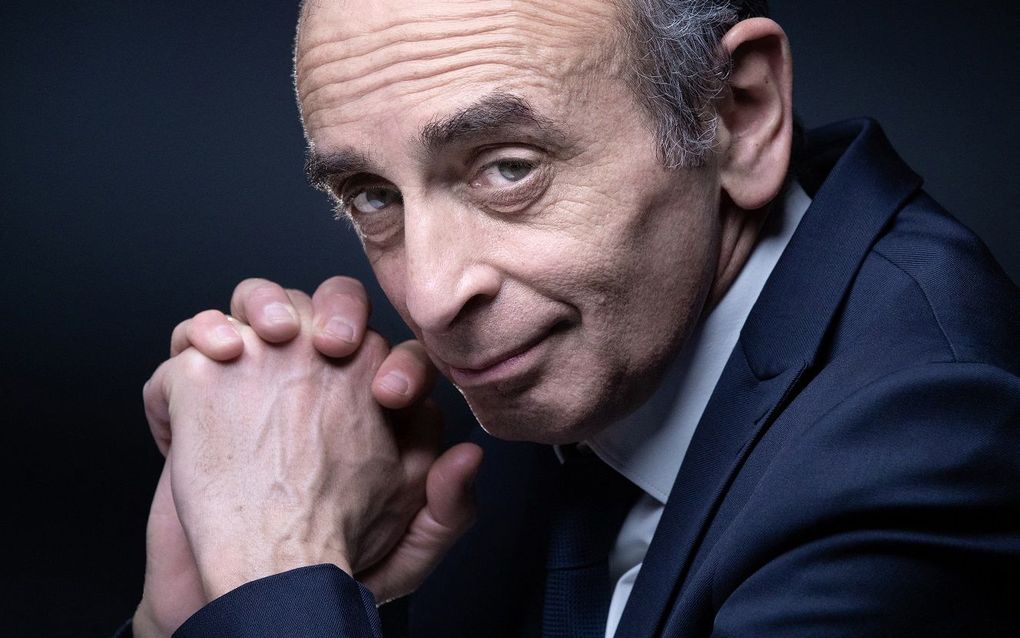French polemic Éric Zemmour divides the Jewish community
09-11-2021
Mark Wallet, RD

Photo AFP, Joel Saget
Jewish organisations in France accuse writer and polemic Éric Zemmour of anti-Semitism. Difficult point: the desired presidential candidate from the far right is Jewish himself.
Not real French people, but foreigners. That is how Éric Zemmour qualifies the three Jewish schoolchildren that terrorist Mohammed Merah killed in Toulouse in 2012. The parents of Arié and Gabriel Sandler (6 and 3 years old) and Myriam Monsonego (8) decided to bury their children not in French but in Israeli soil. According to Zemmour, this made them just as ‘foreign’ as the perpetrator Merah, who wanted to be buried in Algeria.
Whether they are “murderers or innocents, executioners or victims, enemies or friends,” the crucial question for Zemmour is, “ where do they want to leave their bones.” The killed Jewish schoolchildren and Merah were, therefore, “before everything else, foreigners who wanted to remain so after death,” he writes in his latest book, “La France n’a pas dit son dernier mot” (France has not yet said its last word).
His thoughts, which he again publicly defended in September on the French channel France2, provoked many indignant reactions. The umbrella organisation of Jewish organisations in France, CRIF, spoke through its chairman Francis Kalifat of “appalling words, which can only evoke disgust.” In particular, he denounced the “despicable mixing” of executioner and victims.
The Jewish student organization UEJF ruled that Zemmour “smeared” the memory of the children. “If we needed any proof of Éric Zemmour’s baseness, racism and obsession with identity, here it is, shamelessly, in these few sentences”, the students wrote on Twitter.
Monopoly
Zemmour didn’t think about backing down. He had merely provided rational analysis of the course of a dramatic event, he told right-wing CNews. To those who accused him of heartlessness, he quoted words that presidential candidate Giscard d’Estaing spoke to his opponent François Mitterrand during a debate in 1974. “You don’t have a monopoly on the heart, I also have a heart, and it beats its own rhythm.”
The violent reactions also did not lead Zemmour to be more careful in sensitive statements within his Jewish community. In mid-October, Zemmour reiterated his old position that Marshal Philippe Pétain protected the French Jews during World War II. Between 1940 and 1944, Pétain was at the helm of the Vichy regime, which collaborated with the Germans. Relatively many Jews survived in France, but historians conclusively demonstrated that the Pétain regime shared responsibility for the deportation of both French and so-called foreign Jews. President Jacques Chirac recognised this for the first time in 1995.
Espionage
The statements about Pétain fit with the relativistic notions that Zemmour made earlier about the infamous Dreyfus affair. The arrest of the Jewish officer Alfred Dreyfus on charges of espionage in 1894 sparked fierce controversy. Dreyfus appeared to have been arrested based on false documents because of his Jewish background. However, Zemmour indicated in a television broadcast last year that he was not convinced of Dreyfus’s innocence.

The Jewish historian Marc Knobel, affiliated with the CRIF, described that suggestion in the magazine Revue des Deux Montes last month as unadulterated revisionism, the rewriting of history. “Zemmour claims he likes history. But history is not like a weather vane that turns with your ideology. It’s a science.”
Just like previous convictions for racism, the anti-Semitic statements do not seem to stick with Zemmour. According to the most optimistic forecasts, the far-right polemicist can count on 18 per cent of the vote in the presidential elections of April 2022. He is not even an official candidate yet, but polling stations already take him into account. In several polls, he has overtaken his rival on the far right: Marine Le Pen of the Rassemblement National.
He can also count on support from the Jewish side. There is an account on Twitter (although moderately followed) under the name Les Juifs pour Zemmour, Jews for Zemmour. When CRIF chairman Caliphat noted that Zemmour “didn’t deserve any Jewish vote,” Zemmour challenged him to go to the synagogue together and see who is the most popular.
The official organizations may attack him harshly, but among the common man, there is sympathy for his fight against Islam, French daily Le Monde wrote last week. “There is likely a discord between the base and the top,” political scientist Jean-Yves Camus told the newspaper. “The themes that resonate the most are immigration and Islam.” Behind this is the fact that several recent deadly anti-Semitic incidents in France came from Islamic sources.
Hitler
An anonymous Jewish respondent told Le Monde that he is not concerned about the Vichy and Dreyfus polemics. “I don’t care about Petain,” he said. “What is the danger of petainism right now?” For him, the “clash of civilizations” between the Republic and Islam is of greater importance. The newspaper cites a statement by Zemmour in this regard: “Now people are not shouting: Heil Hitler; one shouts: Allahu akbar.”
Critics argue that Zemmour uses his Jewish background tactically. For him, it is “a totem pole of immunity,” essayist Barbara Lefebvre grumbled in Marianne magazine last month.
In that analysis, however, they also find Jean-Marie Le Pen, the 94-year-old former leader of the former Front National, behind them. “The only difference between Éric and me is that he is Jewish,” he said in an interview with Le Monde in early October. “It is therefore difficult to qualify him as a Nazi or a fascist. That gives him a lot more leeway.”
This is a translation of an article previously published in Dutch daily Reformatorisch Dagblad, on November 6th, 2021.
Related Articles





